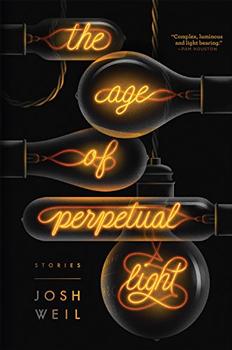Summary | Excerpt | Reviews | Beyond the book | Read-Alikes | Genres & Themes | Author Bio

A Radiant History from Creation to the Quantum Age
by Bruce WatsonBruce Watson's latest work is a whirlwind tour of humanity's perception of the nature of light over the millennia — how something that was once considered miraculous has transformed into a tool that's "cheap and easy, available not just in every home and office but in every palm and pocket."
Watson takes us on a journey through time and begins with the earliest myths about light and its origin. "Because all good came from it and most evil came from its absence," he writes, "primitive people did not study light – they worshipped it." He touches on ancient creation stories from around the globe, including those from Judeo-Christian theology as well as more obscure tales. The Bushongo tribes in the Congo region, for example, believe the god Bumba vomited the sun, followed by the rest of creation. Watson contends that "in all major religions, light's meaning was manifold, encompassing salvation, revelation, the doors of the hereafter, and the essence of the spiritual."
Watson moves on to humanity's first attempts to tame light, such as the building of the remarkable lighthouse at Alexandria in the third century BCE (see 'Beyond the Book'). Also explored are early scientific attempts to understand the nature of light, such as experiments conducted by Abu Yusuf Ya'qub ibn Ishaq al-Kindi (c. 801-873 CE) during the Golden Age of Islam (650-1250 CE) to determine if light was generated by the eye, an object, or by both. Progressing through history, Watson touches on how artists began capturing light's representation in painting and music, how humanity's curiosity drove individuals to try to get to the bottom of what light truly is, before culminating in a discussion of our current technologies and speculating on how we will use light in the future.
Given the scope of its subject matter, this book is short but covers a lot of ground. Many of the names and discoveries will be familiar to readers. For example, Watson writes about contributions from well-known luminaries such as Galileo and Da Vinci, Newton and Edison, Einstein and Planck. He also talks about many lesser-known contributors to this subject — like Francois Arago (1786-1853), French prime minister and discoverer of polarization, and Charles Brush (1849-1929), inventor of the arc lamp — and famous people whom one wouldn't generally associate with the study of light. Goethe, for example, published a four-volume, fifteen-hundred-page work called Zur Farbenlehre — "On Color Theory" — that he "considered...the equal of his literary masterpieces," and also devised a color wheel based on moods he thought were generated by the various colors.
Watson's writing style borders on poetic:
But there was a time when light waged a heroic battle with darkness. It was a time when night skies were not bleached by urban glare, when candles were not romantic novelties, when light was the source of all warmth and safety. For the vast majority of human history, each sunrise was a celebration; each waxing moon stirred hope of nights less terrifying. And to anyone caught unprepared – in dark woods, on echoing streets, even at home when lamps flickered and failed – light was, simply, life.
I found Light to be endlessly fascinating and remained thoroughly captivated by the history presented. The book conveys just enough detail to be informative without becoming so dense that it becomes a mere recitation of facts. The narrative is simple even during later chapters that touch on complex subjects such as Richard Feynman's QED theory – "quantum electrodynamics, the strange theory of light and matter." Through it all the author's wonderment at this marvelous thing called light shines through. It's obvious that he is almost as much in awe of light as were the earliest humans, and that its history utterly absorbs him. Remarkably, he's completely able to pull his readers into this world, helping us see the marvel with new eyes and getting us to realize how much we take this resource for granted.
Watson's writing style keeps the narrative moving and his readers entertained. Readers already familiar with the science may find that Light doesn't provide much new information, but those with only basic knowledge and a curiosity about the natural world will find it a delight.
![]() This review
first ran in the February 17, 2016
issue of BookBrowse Recommends.
This review
first ran in the February 17, 2016
issue of BookBrowse Recommends.

If you liked Light, try these:

by Josh Weil
Published 2018
A dazzling new work that spans a century and eight tales of light, human progress, and the search for a better life from Josh Weil, one of "the most gifted writers of his generation" (Colum McCann), winner of the Sue Kaufman Prize from the American Academy of Arts and Letters

by Ruth Kassinger
Published 2015
In the tradition of The Botany of Desire and Wicked Plants, a witty and engaging history of the first botanists interwoven with stories of today's extraordinary plants found in the garden and the lab.
A book may be compared to your neighbor...
Click Here to find out who said this, as well as discovering other famous literary quotes!
Your guide toexceptional books
BookBrowse seeks out and recommends the best in contemporary fiction and nonfiction—books that not only engage and entertain but also deepen our understanding of ourselves and the world around us.